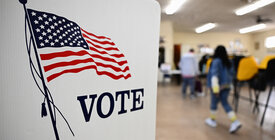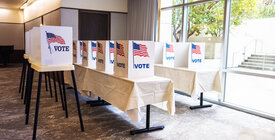Virginia, like most states, allows private individuals to challenge another person’s eligibility to vote. This resource details state and federal laws that govern this process and protect registered voters from baseless challenges. Virginia’s protections include a suspension of the challenge process in the two months before a general election and, during in-person voting, a requirement that challenged voters who sign an affirmation of eligibility are generally allowed to vote a regular ballot.
Virginia law allows for challenges before and during the voting period.
- During the in-person voting period, registered voters can challenge the eligibility of other voters at the polling location.1
- Outside of the voting period, only the general registrar and the county or city circuit court may accept challenges, and only if they are made jointly by three registered voters from the same county or city as the challenged voter.2Challenges are prohibited if the basis for the challenge is that the voter moved.3
- The registrar may not hold any hearing (or otherwise act) on a challenge within 60 days of a general election or within 30 days of any other election.4
Unless a challenge is filed within six months of a voter’s registration, “It shall be conclusively presumed in all proceedings where the right of such person to registration arises . . . that such person has complied with all the procedural requirements of the law in making an application for registration.”5
Challenges must be in writing and signed subject to penalties for false statements, voter intimidation, and interference with voting.
- A registered voter who challenges the eligibility of another voter during in-person voting must sign a form that:
- 1) indicates the ground for the challenge; and
- 2) acknowledges the challenge is subject to the penalties for intimidating and interfering with voters (a Class 1 misdemeanor) and making false statements on an election form (a Class 5 felony).6
- It is a Class 5 felony to make “any willfully false material statement or entry . . . in any statement, form, or report” required by the Elections Code.7
Additionally, challenges should not be made frivolously.8
In nearly all circumstances, a voter challenged during in person voting can vote a regular ballot if they sign an affirmation.- If the challenged voter signs an affirmation of eligibility, they have the right to vote a regular ballot unless the ground for the challenge is that the voter already voted, in which case they may vote a provisional ballot.9
- When a challenger presents a signed challenge form, the officer of election is required to explain the qualifications for voting to the challenged voter and can question the challenged voter about their qualifications.10
Any witness making statements in relation to the challenge must take an oath administered by the officer of election.11
Voters challenged outside of the in-person voting period have a right to notice and a hearing on their eligibility.
- If three registered voters file a challenge to a voter’s eligibility with the general registrar, the registrar must send the challenged voter a notice by mail that includes the grounds for the challenge, the facts in support of the challenge, and the time when the registrar will hear testimony in support of or against the cancellation of the voter’s registration. The registrar must also post the notice of cancellation at the courthouse or in a general circulation newspaper.12
- The hearing on the challenged voter’s eligibility must be held no less than 10 days after the notice is mailed to the voter.13
- Hearings are prohibited within 60 days of a general election or within 30 days of any other election.14
- If challengers bring multiple challenges based on internet searches or database-matching, removals based on such challenges would amount to a “systematic” removal of voters, which federal law prohibits within 90 days of a federal election.15
A voter whose registration is canceled has the right to appeal the general registrar’s decision to the circuit court.16
Almost no challenge should result in the immediate removal of the voter from the voter rolls.
In addition to the notice and hearing requirements for challenges to a voter’s eligibility, the National Voter Registration Act further limits when and how voters can be removed from the rolls. Under the act, states and counties are permitted to remove a voter in just five circumstances: if the voter affirms the change; if state law requires removal for a criminal conviction or mental incapacity; for the death of the voter; if the voter confirms a change of residence in writing; and based on other evidence of a change of residence, but only after the state sends a notice and the voter both fails to respond and fails to vote in the next two federal general elections.17These restrictions apply regardless of whether county boards of elections are conducting their own list maintenance or responding to challenges.
• • •
Voters in Virginia have the right to vote free from intimidation under federal and state law. Baseless challenges to a voter’s eligibility can harass and intimidate the voter being challenged, as well as other voters waiting to vote at the polls. More information on the federal and state laws that protect Virginia voters from intimidation can be found here.
If voters discover they’ve been mistakenly removed from the rolls, they can re-register and vote at the offices of the general registrar during early voting and at their polling place on Election Day.18More information on same day registration and voting can be found here.
Endnotes
-
1
Va. Code Ann. § 24.2–651.
-
2
Va. Code Ann. §§ 24.2–429, 24.2–431.
-
3
Id.
-
4
Va. Code Ann. § 24.2–429.
-
5
Va. Code Ann. § 24.2–434.
-
6
Va. Code Ann. §§ 24.2–651, 24.2–1016.
-
7
Va. Code Ann. § 24.2–1016.
-
8
Virginia Department of Elections, Dos and Don’ts for Campaigners and Authorized Representatives, 5.
-
9
Va. Code Ann. §§ 24.2–651, 24.2–651.1.
-
10
Va. Code Ann. § 24.2–651.
-
11
Id.
-
12
Va. Code Ann. § 24.2–429.
-
13
Id.
-
14
Id.
-
15
52 U.S.C. § 20507(c)(2)(a) ; U.S. Department of Justice, Voter Registration List Maintenance: Guidance under Section 8 of the National Voter Registration Act, 52 U.S.C. § 20507, 4, September 2024, https://www.justice.gov/crt/media/1366561/dl
-
16
Va. Code Ann. §§ 24.2–430, 24.2–422.
-
17
52 U.S.C. § 20507(a)(3), (d).
-
18
Va. Code Ann. § 24.2–420.1.


